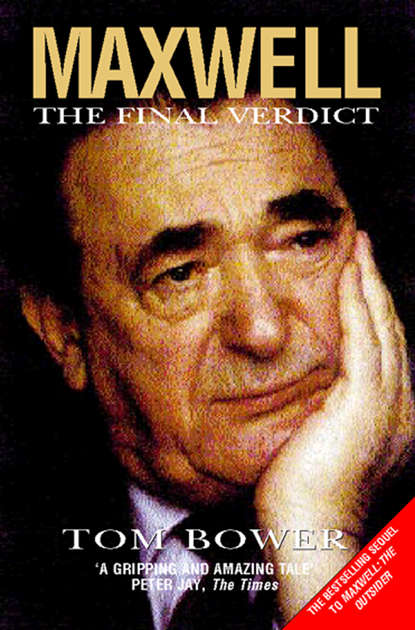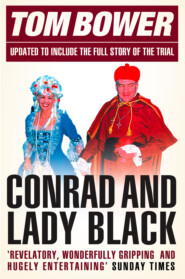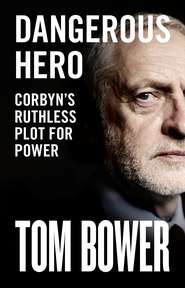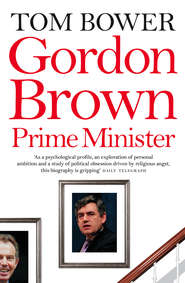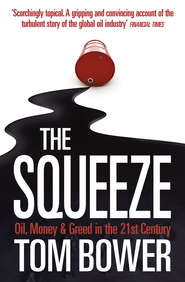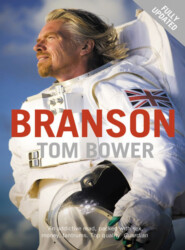По всем вопросам обращайтесь на: info@litportal.ru
(©) 2003-2024.
✖
Maxwell: The Final Verdict
Настройки чтения
Размер шрифта
Высота строк
Поля
‘Because it comes from the Mirror Group,’ replied Ford with startling honesty.
Tapley gasped, ‘This is another conflict of interest. It will be forbidden by IMRO.’
Tapley appealed to Kevin. It was an unwelcome approach and Kevin repeatedly cancelled the appointment. When they finally met, Kevin agreed, ‘We must close that stock-lending operation down.’ But he made it clear that Tapley was no longer welcome in his office – he was disrupting the Maxwells’ operation. Of course the stock lending would not stop, but Kevin agreed with his father that it might be dangerous to dismiss the manager in breach of his contract. Better to keep him inside the tent and quiet. For his part, Tapley did not welcome the prospect of litigation with the Maxwells if he himself sought to break his contract, nor would he relish the loss of his high income in the middle of a recession.
Come July 1990, Tapley was still concerned by LBI’s stock lending of First Tokyo shares. ‘Why are you bothered?’ asked Trachtenberg. ‘It’s nothing to do with you!’ By then, Stuart Carson, LBI’s new compliance officer, responsible in the new self-regulatory era for ensuring fulfilment of statutory requirements, had consulted IMRO. The regulatory agency confirmed that IMRO rules did not forbid the conflict of interest prompted by stock lending. ‘It isn’t forbidden,’ reported Carson.
Two palliatives were proposed. Jean-Pierre Anselmini, MCC’s French deputy chairman, was that same July temporarily appointed an LBI director. Tapley’s initial relief disappeared when Anselmini began to postpone important meetings. ‘You’re intransigent,’ he told Tapley in stilted English, ‘making the management more difficult by distressingly insisting upon standards against Smith.’ Tapley’s appeals to Donoughue were also rebuffed. Urging self-restraint, the peer told him, ‘We must try and keep this together. We’re a good team.’ Donoughue was supported by George Willett: ‘Don’t go to IMRO. Stop making distinctions between moral and legal issues.’ Tapley was persuaded to keep quiet by three men whose motives he found unclear. Tapley accorded Donoughue the nickname ‘Manuel’, the character in the television sitcom Fawlty Towers famous for his repeated claim, ‘I know nothing.’
At the end of the day on 3 August 1990, after many cancelled meetings, Tapley was finally admitted once more into Kevin’s office. ‘The stock lending must stop,’ agreed Robert Maxwell. Satisfied that he had got what he wanted, Tapley distributed a memorandum describing a newly reorganized LBI which would exclude Smith and Trachtenberg. Two hours later, Kevin telephoned, his voice betraying deep anger: ‘That memo must be withdrawn. It’s premature.’ During that short interval, Kevin had understood the implications for the empire’s survival of Trachtenberg’s removal.
In the course of successive meetings in late October and November, Tapley was convinced by Kevin and Donoughue that LBI would be reorganized. ‘We’ll get rid of the Max Factor,’ both pledged, referring to the negative influence of Robert Maxwell. Tapley was relieved. But in reality he had been sidelined. The Maxwells’ priority was to silence their critic while they sought cash from any source to sustain their increasing debts. In September Kevin had committed himself to his father’s scheme of arrangement. Searching through BIM’s monthly schedule of shares owned by the pension funds, he had noticed the name Euris, a French investment fund. Euris, he knew, did not issue share certificates. Instead, the only proof of ownership were the records held by the company’s secretary. Transfer of ownership was settled by a simple letter notifying a sale.
On 3 September 1990, Kevin wrote, as a director of BIM, to Euris’s company secretary instructing that 2.2 million shares worth £32 million had been ‘transferred’ from BIM to Pergamon Holdings, a transfer which contravened the trust deed. (The board minutes were signed by Kevin, Ian and Robert Maxwell, with Anselmini as a witness. BIM’s articles required two signatures for a transfer.) On the same day, Kevin pledged the shares to BNP, the French bank, as collateral for a private loan. He then kept silent about the transfer. Trevor Cook, BIM’s manager, was not told, and Euris remained listed on BIM’s schedule as a pension fund share. By any measure, it was unauthorized, but it was a mere curtain-raiser to the increasingly drastic measures undertaken by Kevin to raise cash during October.
His targets were two fund managers of pension fund shares. In October 1990, he asked the managers of Capel Cure Myers and Invesco MIM for the temporary return of shares owned by the pension funds for stock lending. On 8 October, Capel Cure, on Kevin’s instructions, sent shares worth £40 million for stock lending to Lehmans. Capel Cure’s covering letter explicitly informed the bank that the shares were owned by the Mirror Group Pension Scheme. The reason for their action, some suggest, was that an assistant director at Capel Cure appreciated that the pension fund shares were to be used as collateral for a loan rather than for stock lending and sought to protect his position.
The following day, 9 October 1990, Kevin and Cook, acting as BIM directors, instructed Invesco to send its pension fund portfolio worth £30 million to Lehmans. The letter, signed by Kevin on behalf of the Mirror Group Pension Scheme, assured Invesco that the shares would be used for normal stock lending and returned ‘within 30 days’. Lawrence Guest, a Mirror Group director and one of the fund’s trustees, was not told about the ‘stock lending’. He would only discover in November 1991. Initially, there was no reason for the other fund managers to suspect that Kevin’s instruction was not straightforward, but the arrangement did disturb Tim Daily, Invesco’s expert in stock lending. Daily, twenty-seven years old, was an ambitious, working-class trader born in Watford with just six O levels who unashamedly wanted ‘to taste the good things in life’. Hired in April 1990 to expand Invesco’s stock-lending business, he had recently been appointed the chairman of the International Stock Lending Association, the industry’s spokesman in dealing with both the media and the Bank of England. Among his targets for Invesco’s new stock-lending business were the Maxwell pension funds.
The news that Maxwell was intending to use a rival for stock lending was passed to Daily that same day, 9 October, in a panic telephone call from Peter Smith, his subordinate. Daily, in Naples, Florida attending a stock-lending conference, was chastened by the report. ‘It all sounds a little bit fishy,’ Smith told Daily, ‘and not quite as cut and dry as it seems.’ On hearing the news, he added, he had telephoned a friend at Lehmans and had been told that the portfolio was to be used not for stock lending but ‘purely as collateral for a loan’. Smith added that, to his surprise, Trachtenberg had also telephoned asking him not to speak to Lehmans. Daily decided to approach Mark Haas, the bearded and ambitious Lehmans securities executive responsible for negotiating the transaction with Kevin and Trachtenberg, who was also attending the conference in Florida.
Minutes later, Daily found Haas watching a game of pool. ‘Are you taking away our client for stock lending?’
‘No,’ replied Haas. ‘We’re doing a Treasury repo. Not stock lending. Maxwell is having trouble raising cash’ and was using pension fund assets. Haas knew that MCC, under pressure to repay debts, had asked Lehmans for a $15 million loan for one month. His superiors, after reading MCC’s accounts, had vetoed the idea out of fear of Maxwell’s ‘potential for manipulation [of] profits’ and because MCC’s accounts revealed assets of minus $2.2 billion because of the debts. Moreover, at Lehmans, the very nature of the transaction – whereby shares ‘borrowed’ by Kevin were exchanged for the final total of $83.9 million in cash and paid to Maxwell’s private company – enabled the bankers to understand precisely the unusual use that was being made of pension fund assets.
Haas did not reveal those details that day in Florida, but enough had been said to prompt Daily’s comment: ‘I don’t like the sound of it. It’s a bit dodgy.’
‘We haven’t had this conversation,’ replied Haas. ‘I know my half. You know your half. Together we know too much.’ Haas would deny this version of the conversation.
Daily ignored this advice and reported the conversation to Bob Southgate, his superior in London. Southgate’s reaction was, ‘It’s all very sensitive,’ referring not to Maxwell’s financial predicament, but to the fact that Maxwell owned a 20 per cent stake in Invesco MIM and was a friend of the fund’s chairman, Lord Stevens (moreover its president was Lord Rippon, a director of MCC). After a number of huddled conversations, Invesco’s managers agreed to accept Maxwell’s assurances.
In the event, the pension fund shares were exchanged with Lehmans for Treasury bills which were then cashed. The money was paid not to the pension funds but to LBI and then to Headington Hill Investments, Maxwell’s private company. The bankers’ apparent lack of concern that Maxwell might have been using pension fund shares to raise cash was reflected in their confused records. Haas was dealing with LBI, Maxwell’s private investment company, which allegedly was representing BIM, the pension fund managers. Yet in Lehmans’ records the depositor of the shares was recorded as ‘LBIIM’, a different entity, suggesting unusual carelessness by the bank.
Trevor Cook, meanwhile, was not only ignorant of the deal negotiated by Trachtenberg and Kevin with Lehmans, but when on 16 October Daily arrived at a Maxwell office in Shoe Lane to meet him and Trachtenberg, he remained unaware of the Invesco trader’s conversation with Haas. Daily had invited himself to present his expertise in stock lending. Towards the end of the meeting, Trachtenberg explained to Daily that LBI was paying 1.75 per cent for stock-lending fees. Although Daily realized that the figure was higher than normal, he said nothing. Cook also stayed silent: he knew that LBI’s fees might be high but he ‘had no point of reference’. Any doubts were offset by Donoughue’s presence within LBI. ‘I trusted Donoughue and he knew that we were stock lending the pension fund assets. I assumed it was all right,’ recalled Cook.
‘That was a load of rubbish,’ Daily said to his colleagues as they descended in the lift.
‘Don’t say anything here,’ replied one of the other occupants. ‘The lift’s probably bugged.’
Cramped into a small office on their return, Daily told his superiors, ‘It’s all wrong.’ The response was equivocal. To refuse to comply with their client’s request was out of the question, not least because Maxwell was a shareholder and a friend of Lord Stevens. So, on 19 October, after several telephone calls asking, ‘Is it all ready?’, Trachtenberg arrived in Invesco’s entrance hall and personally took the share certificates from Daily, signing a receipt. On one issue Trachtenberg was insistent: the transfer was temporary. The certificates were to be returned in thirty days.
To regularize the arrangement, Kevin and Robert Maxwell signed a contract. Kevin (on behalf of BIM) and his father (on behalf of the Robert Maxwell Group) agreed that RMG could borrow BIM’s stock. Although dated 1 October 1990, it appears to have been formulated at the end of 1990 to cover the Capel Cure and Invesco transactions. It allowed both Kevin and Trachtenberg to reinforce the claim they were making to Cook that pension fund assets were involved in stock lending. But Cook, although he was BIM’s manager, was not suspicious. After he had received a letter from Lehmans stating that the shares and Treasury bills ‘were held for your account’, he assumed that the pension funds were covered by genuine collateral of between 125 and 150 per cent. But he never actually saw any share certificates, nor did he ask to see anything. ‘I just got lists and letters,’ Cook later reflected ruefully, ‘from Trachtenberg on behalf of LBI.’ Everything, he believed, was held by the banks. He did not ask to see the Treasury bills nor did he realize that they had been cashed. ‘I should have checked the share certificates but I didn’t suspect anything. I was fooled.’
The deception was intentional. On returning to his office after meeting Daily, Trachtenberg had sent a revealing memo to Kevin about their arrangement: ‘I assured them [Tim Daily and colleagues] that LBI’s involvement was in a strictly advisory capacity, and that our [LBI’s] involvement in no way involved LBI utilizing stock in security transactions on its own behalf.’ The problem, he realized, was how to orchestrate ‘a clean transfer’ of the pension funds’ shares from BIM to the banks, concealing their true ownership. Kevin’s reply was not preserved.
At the end of this period of frantic activity, Kevin agreed over the weekend of 3 November to play poker with some friends in the City and host a firework party at Hailey, his home near Wallingford. It was a brief interlude before he secured the £50 million loan from Julie Maitland at Crédit Suisse and obtained the Berlitz share certificates.
THREE Hunting for Cash – 19 November 1990 (#ulink_d039697c-c1a2-5d74-8dde-b74e0509b1c7)
On Monday, 19 November, Kevin flew to New York on the evening Concorde. As usual he stayed at the Carlyle, the choice of many international tycoons as Manhattan’s most discreet yet sumptuous hotel. After shuttling between seventeen meetings with Macmillan executives and bankers the following day, he slept overnight on a British Airways Jumbo back to London. He had every reason to feel satisfied. Everyone he had met had appeared reassured by his self-confident manner, his deep-voiced, decisive tone and his air of efficiency. None would have guessed that the polite, well-dressed Englishman was concealing near-bankruptcy. Punctually at 6.30 a.m. the Jumbo glided on to Heathrow’s runway, and Kevin separated himself from his fellow passengers to be whisked through the special customs facilities, before being helicoptered by Captain Cowley to Maxwell House in Holborn to begin the day meeting Larry Trachtenberg. The pace was unremitting.
Robert Maxwell was at that moment flying to Los Angeles. Since 12 November, the Chairman had been travelling across America in what he called a roadshow to launch the Central and Eastern European Fund, a banking venture concocted with Merrill Lynch to entice financial institutions into investing $250 million on the basis of his expertise in the former communist countries. To Maxwell, short of money yet eager to exert the influence of a billionaire, the Fund was a last effort to grasp large amounts of other people’s money to be used for his own benefit. Over several days, he met bankers, pension fund managers and corporation presidents in an attempt to persuade them to earmark funds. For those like Katherine Pelley, one of the banking aides in his retinue, the roadshow was becoming a harassing adventure. Regularly late to meetings and delivering lacklustre speeches, Maxwell was proving to be a ‘nightmare’, a liability rather than an asset to his own ambitions. The burden of his deception was sapping his self-confident assertions of his financial prowess. Dispirited, he returned to London for an MCC board meeting, which was to be held at 5 p.m. on 23 November.
Regardless of his perceived troubles and bad press, Robert Maxwell believed that he could still count upon the support and sympathy of the six non-family directors who, though acknowledging that he was a difficult man, believed in his genius. Besides the executive directors Jean-Pierre Anselmini, Ron Woods, Richard Baker and Basil Brookes, the young acting finance director recruited from Coopers in 1986, there were two older non-executive directors: Lord Rippon, the former Conservative minister who had negotiated Britain’s entry into the European Union, and Peter Laister, a former managing director of Thorn EMI with a fair reputation in the City.
For all of them, the DTI inspectors’ damning judgment in 1971 that Maxwell could not be ‘relied on to exercise proper stewardship of a publicly quoted company’ was ‘history’. All of them had witnessed the ‘City process’ and tended to feel contempt, even ‘disgust’, for the slickers’ ‘behaviour around the carcass’. Maxwell impressed them on several levels: as a polyglot at the centre of an extraordinary network of relations with world leaders; as a newspaper tycoon who had broken the trade unions; and as a superman able to revive dying companies. Accordingly they were prepared to allow the Chairman near-dictatorial powers.
Of course, these men were well rewarded, especially Rippon. As chairman of Brassey’s, the military publishers owned by Maxwell, he was paid $100,000 per annum, and he drew generous expenses. On one occasion, Maxwell simply wrote a cheque for £10,000 at his request. For his part, Maxwell admired Rippon’s transformation of Invesco MIM, but it was Rippon’s bank, the Robert Fraser Group, which gave him the greatest help. Through Robert Fraser, Maxwell had pumped into MCC and Pergamon Holdings some of the money taken from the pension funds, and had completed three property deals to pump profits into MCC which later investigation would reveal to be dubious. In 1989, no less than 33 per cent of MCC’s profits were ‘one-off’ transactions with Robert Fraser recorded just before the announcement of the interim profits. In 1990, 43 Per cent of the Group profits were one-offs with companies incorporated in Liechtenstein and the Isle of Man or with BIM and Robert Fraser. But although he could count upon Lord Rippon, Maxwell knew that there were tensions with the other directors. Anselmini, the proud French banker, did not appreciate the way the Publisher ignored his title as deputy chairman, and failed to consult him. A newspaper revelation that Maxwell, to boost MCC’s share price, had gambled on a put option with Goldman Sachs had alarmed him. ‘You’re not the regulator’ was Maxwell’s response, surprised that the Frenchman should choose to protest now, since the Publisher had bought a similar option from Goldman Sachs of 10 million MCC shares in March 1990 and another from BIT for £18.9 million.
‘I don’t understand,’ sighed Anselmini. ‘You do not do what you say or say what you do.’ Maxwell had nevertheless abruptly promised not to repeat the ploy.
When eight MCC directors met on 23 November (without Ian Maxwell), Robert Maxwell anticipated some disagreement but, given that around the table were gathered well-paid subordinates whose devotion and above all loyalty had hitherto been unconditional, he expected them to exercise a degree of reticence. All of them had, after all, witnessed how MCC’s profits had been maintained only by his skilful property deals and currency speculation – transactions which had attracted the critics’ scorn and, more recently, some suspicion, but they had provided the company’s only respite from commercial decline. Two items dominated their agenda that day: finalizing the interim accounts, and agreeing the interim dividend.
As always, Maxwell’s priority was to maximize the profits. Only high earnings would support MCC’s share price. Kevin naturally sided with his father, a stance also adopted by the company’s auditors present at the meeting. Both Neil Taberner (for MCC) and Peter Walsh (for RMG), the faithful and all-too-unquestioning accountants from Coopers, were content to be used by the Chairman to fulfil his puff which featured prominently in the partnership’s annual report: ‘Coopers always gives an immediate response and always provides what I want within my deadline.’ In earlier years, Reg Mogg, MCC’s previous finance director, had with Taberner’s help legally transformed the debt-laden company’s accounts so that they boasted profits. Not the least of his successes was persuading Taberner in 1990 that the value of MCC’s ‘intangibles’ (its goodwill and publishing rights) was £2.2 billion. Coopers were not only generous in their valuations but were allowing MCC to retain an ‘intangible’ on its balance sheet even after the sale of a subsidiary. One year later, other accountants valued the ‘intangibles’ at £300 million.
Ron Woods, the tax expert and MCC director, had already seen the in-house accountants’ preliminary treatment. Nearly all the proposed profits had been earned from foreign exchange speculation. Unlike the non-accountants, he noticed that the auditor had bowed to Maxwell’s pressure in allowing the foreign exchange profits to be placed above the line to boost overall profits, while camouflaging losses in the ‘transition account – reserves’. Taberner knew precisely what Maxwell expected from his accountant.
That creative treatment provoked no dissent. Instead, a row erupted over the proposed dividend. Maxwell wanted shareholders – of which he was by far the largest – to receive £44.5 million in cash. One consequence of Coopers’ treatment of MCC’s accounts, certified as ‘fair and true’ for the shareholders and Inland Revenue, was the concealment of the company’s net liabilities: Analysts would later discover that in 1989 the company’s real liabilities had been £684 million, in 1990 they had risen to £859.2 million and during 1991 they would zoom to £950.2 million. But the reality of those debts was not apparent in the published accounts. Anselmini, knowing the company’s precarious state, condemned the notion of a pay-out. He was supported by Richard Baker, the rough managing director. Although Baker’s office walls were covered with Pirelli calendars of semi-nude girls and although visitors had to endure his crude jokes, it was his integrity which had secured Maxwell’s original ‘war chest’ in 1988 to finance the Big One, the acquisition of Macmillan. Bankers trusted Baker, and ten banks had pledged £200 million each, an event celebrated with a champagne party on board the Lady Ghislaine. But in the years since then Baker’s loyalties had frayed. Now, for the first time, he opposed Maxwell’s demand for an increased dividend. The company’s finances, he argued, were too perilous. A lot of the published profits, he knew, were illusory and there was simply no cash to pay for a dividend. To Maxwell’s fury, he was supported by Woods.
After a thirty-minute explosion of emotion, Anselmini gave way, having been assured that Maxwell would take his dividend in shares. But in the vote Baker and Woods remained opposed, though they were outvoted by the other six directors. Over the following three days, Baker and Basil Brookes, the thirty-four-year-old finance director appointed at the board meeting on 23 November, argued for a compromise statement that ‘a satisfactory outcome for the year is dependent upon the disposals’. Much of the empire would need to be sold to raise money to repay the loans – a self-defeating strategy. Both men visited Kevin at home. Baker’s persistence had infuriated the Maxwells and, despite his loyal service, he was instantly excommunicated. He had little option but to take early retirement, allowing Kevin to inherit his powers. Robert Maxwell was delighted. Baker had been too straight. Whenever the Maxwell private companies had bought or sold something from MCC to boost profits, Baker had argued MCC’s case too strongly. A cash dividend would now be paid; and the accounts, without a caution, were approved. Anselmini did not protest. The empire took another lurch towards doom.
With that issue settled, at 9.30 a.m. on 26 November Maxwell flew by helicopter to Farnborough to board the Gulfstream for Vienna. As he gazed at the print-out of the day’s programme, his sense of his own importance was appreciably enhanced. He noted that Charlotte Thornton, his pretty new secretary (‘A diluted successor to Andrea Martin,’ commented Woods), had listed the telephone numbers, much as if he were a head of state, of the two Mercedes which would meet him at Vienna airport. He would be driven to the Imperial Hotel, the capital’s best, to dispense a succession of newspaper interviews before handing over a cheque for £15,000 to the director of the national library at a ceremony attended by Franz Vranitsky, the Austrian prime minister. Altogether, his profile would be raised in that small, former Nazi state.
The highlight of the visit was that evening’s dinner arranged by Ulrike Pöhl, the wife of Germany’s central banker. A private room had been reserved at the Steirer Eck, one of Vienna’s best restaurants, to entertain the Austrian prime minister and his wife. Although Betty was listed among the guests, Maxwell had not bothered to invite her. At the end of an enjoyable meal – it was especially agreeable for Maxwell, who had taken the opportunity to lecture the prime minister about the confidences shared with him by the world’s leaders – he pushed his plate back and announced, ‘Well, I’ve got to get to America.’ The admiring gaze of his hosts was like a tonic, dispelling any doubts: the Austrian politician could not claim to have an executive jet at his beck and call.
At ten o’clock that night, Maxwell boarded the Gulfstream. The divan bed was already prepared. An adventure movie was in the video machine. A bottle of Perrier and one of Dom Pérignon 1982 were ready to be opened, and because Maxwell enjoyed a second dinner the fridge was filled with food prepared by Martin Cheeseman. Clearance was given to Captain Hull to take off. After refuelling at Luton, the Gulfstream headed for Atlanta, Georgia, a ten-hour flight. As usual on the transatlantic flight, Maxwell swallowed a sleeping tablet and slumped into deep unconsciousness.
Awaiting him were endless meetings across the USA, in Florida, Illinois, Washington, New York and Minneapolis, to persuade more bankers and pension fund managers to invest in his Central and Eastern European Fund. Getting control of their money had become important to his survival, but to his irritation Merrill Lynch was failing to deliver eager investors. A telephone call to Kevin reconfirmed their precarious financial position. Supporting MCC’s share price was proving expensive: the £50 million loan from Crédit Suisse had been spent, as had the $84 million raised through Lehmans. Maxwell’s needs seemed limitless. He ignored any suggestion that his strategy was flawed, that he was spending too much to save the company and losing any chance of survival.
FOUR Misery – December 1990 (#ulink_968074f0-5be2-5ebe-9637-ee9062165988)
The financial crisis was made worse by his loneliness. On 2 December, Maxwell awoke in the Halekuani Hotel in Hawaii. Anyone else welcomed at the airport by the presentation of garlands around his neck would have gazed at the blue Pacific and at the soft yellow sand and have marvelled at life in that paradise. Maxwell could contemplate only his imminent eight-hour flight to Tokyo, where he was to spend three days peddling his Fund to expressionless Japanese bankers and fund managers. No one cared how he felt. One message from London caused particular anxiety.
John Cowling had just arrived in Dorrington Street to carry out the audit of the 1990 accounts for BIM and the pension funds. A partner in Coopers since 1988, Cowling was accompanied by John Mellet and Clare Gardner. Since their completion of the 1989 accounts, much had changed and it was Maxwell’s fervent hope that those developments would remain concealed. But it was not long since he had praised Coopers for ‘always [providing] what I want within my deadline’, and the omens seemed favourable that he would receive the familiar service.
A tremor at the end of November when two IMRO officials had paid their first visit to BIM’s office had fortunately proved short lived. Although it was flagged as a ‘routine visit’, Cook reportedly was ‘in a bit of a flap’. Robert and Kevin Maxwell had beckoned him to the Chairman’s office at 4.30 p.m. on 21 November to offer reassurance. ‘There’s no need for any concern. Get Stuart Carson in to help,’ Maxwell had advised. LBI’s compliance officer was a lawyer recruited from Lautro, another government regulatory agency. Maxwell hoped that the inspectors could be steered in the right direction if they demanded sight of the pension funds’ share certificates. In the event, the Maxwells’ nonchalance infected Cook and he managed to greet the IMRO officers in an unconcerned manner. Just as the Maxwells anticipated, the bureaucrats proved to be incompetent. The two inspectors – described by both Highfield and Cook as ‘young and inexperienced’ – had stayed for one day. Their only recommendation was that BIM needed to improve its documentation. ‘A bit of an anti-climax,’ concluded Highfield.
Cowling’s visit, Maxwell feared, would be worse. There were good reasons for his concern. Since the last accounts, dated 30 June 1989 and covering the previous eighteen-month period, his private companies’ debt to BIM, despite the recent settlement, had risen to £40 million. Moreover, to any practised accountant, the pension funds’ involvement in Maxwell’s share sales on the eve of the financial year’s end would have suggested questionable window-dressing. Yet Cook’s fear that Cowling would complain about the delay in repaying the debt proved unfounded: he had underestimated Maxwell’s relationship with the partners at Coopers, whose tolerance, understanding and willingness to take the Publisher’s assurances on trust were a great comfort to him.
Taken together, Maxwell’s 400 companies were by far Coopers’ biggest clients, producing annual fees of £5 million. Although he occasionally feigned innocence about taxation, Maxwell possessed an astute understanding of accounts and accountants. Twenty-five years earlier, he had tyrannized John Biggs, the stuttering, alcoholic auditor of Pergamon, into approving his fictitious accounts and concealing the fraudulent management of his first public company. Such tactics were no longer appropriate. Instead, he resorted to a charm offensive, smothering with eyewash John Cowling, Neil Taberner, Stephen Wootten and Peter Walsh, all Coopers accountants responsible for different branches of the empire.
John Walsh had been auditing Maxwell’s companies since 1970 and prided himself as ‘one of the trusted old faces’. In 1991 Walsh explained in a self-congratulatory memo to his colleagues that Coopers’ close relationship with Maxwell was unusual since, though he had ‘used almost every lawyer, every broker and every merchant bank in London, he has been totally loyal to Coopers … because we stood by him in the 1970s when everyone else avoided him (National Westminster Bank is in a similar position)’.
Recognizing the importance of Maxwell’s accounts, Coopers had even established an office in nearby Plumtree Court from where they had easy and continuous access to the Maxwell finance departments. The accountants adopted a trusting approach towards the Maxwell empire – believing that it was the directors’ responsibility to compile the accounts and indicate any problems. ‘An auditor’, Walsh would fondly repeat, ‘is not like a ferret pointed at a rabbit warren just to see how many rabbits come out.’ Walsh would also defend the absence of any discussions between the Coopers auditors working for the empire’s different segments. Maxwell’s canny compartmentalization between MCC, RMG, BIM and many other companies was willingly self-imposed by Coopers upon themselves. ‘I never spoke to Neil Taberner,’ Walsh would admit. That self-denying ordinance was vital to the auditors’ subsequent claims that they had not known of the huge inter-company loans between Maxwell’s public and private companies, including BIM. ‘Auditors are not given crystal balls,’ argued Walsh, in support of his professions of ignorance. Responsibility for the accuracy of the accounts, the Coopers men endlessly repeated, rests with a company’s directors, and that was a responsibility which the Chairman was pleased to accept.
To aid him in that task, he looked out for those weak but ambitious Coopers employees who could be recruited to work directly for him. The presence within the empire of young men like Basil Brookes and Jonathan Ford, and retired senior auditors like David Corsan (who had previously audited the whole Maxwell empire), tempted by higher salaries, made that disingenuous eyewash easier to dispense inside the auditors’ headquarters. The beneficial result was that, consistently in previous years, the value of MCC’s assets and its profits had been wildly inflated. Maxwell’s £49 million losses after the 1987 crash were relegated to an obscure footnote; suspicious currency speculation featured as trading profits; while the valuation of ‘intangibles’ at £2.2 billion was eight times higher than their true value. Coopers’ annual blessing of Maxwell’s fabrications had allowed his regular boast about ‘record profits’ to pump up both MCC’s share price and his own self-esteem.
Pinpointing the chaos in BIM’s accounts should have been an uncomplicated task for Cowling. In 1989, an auditors’ report had mentioned that Maxwell appeared to control BIM – ‘a high-risk company easily influenced by senior management’ – and criticized the supervisory systems as ‘poor’. An internal Coopers memorandum about the pension funds’ investments highlighted the risks of stock lending and the funds’ growing stake in MCC, prompting the auditor’s comment that Maxwell’s management of the fund as his personal vehicle free of any independent, basic controls was ‘risky’. One year later, matters were made worse by the apparent confusion of information sent to Cook by Larry Trachtenberg. Although BIM’s investments, income and payments to pensioners had been systematically recorded, Cook complained to Cowling that he was ‘confused about the income from stock lending. We’re going backwards and forwards, and we’re getting contradictory information.’ He claimed to be puzzled because LBI had not submitted proper accounts to BIM. ‘Nothing they give us makes any sense,’ Cook told Cowling. ‘It’s all late, incomplete or wrong.’ Since Cowling was also LBI’s auditor, it seemed that he was ideally placed to unravel the confusion.





